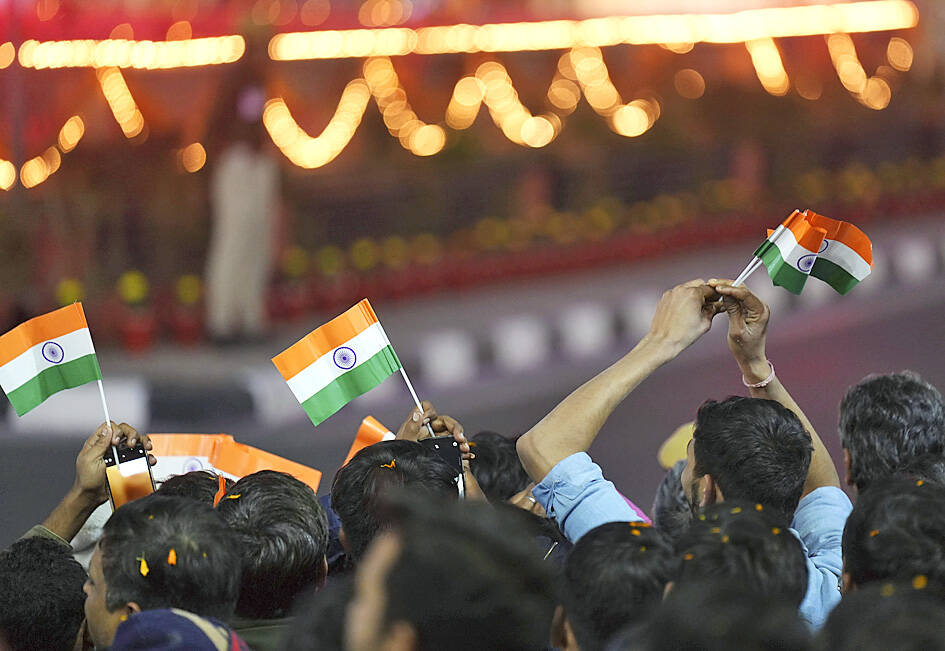Taiwan and India yesterday signed a memorandum of understanding (MOU) on migrant workers, the Ministry of Labor confirmed in a news release.
The Taipei Economic and Cultural Center in India, Taiwan’s de facto embassy, inked the agreement with its Indian counterpart, the India Taipei Association (ITA).
The ministry’s comments came hours after Chinese-language media reported that a labor agreement had been reached.

Photo: AP
The two nations inked the MOU via teleconference and pledged to conduct further talks on policy details, marking an advance in bilateral economic cooperation, the ministry said.
Representative to India Baushuan Ger (葛葆萱) and ITA Director-General Manharsinh Laxmanbhai Yadav have signed and exchanged documents toward finalizing the agreement, which is in sight, but has not been completed, it said.
The MOU stipulates that Taipei would decide the number of migrant workers and types of industries, New Delhi would handle recruitment and training, and that employment and border movements would be governed by the laws of both countries, it said.
Further details, such as where the workers would come from, qualification standards and recruitment methods are to be determined in future talks, the ministry added.
Negotiations on opening Taiwan to migrant workers from India began in 2020, but were shelved because of the COVID-19 pandemic, it said.
The ministry would present the agreement to the Legislative Yuan for ratification following its completion and draft supporting measures, it said.
An aging population and a falling birthrate have boosted demand for foreign workers, especially for labor-intensive work, beyond what Vietnam, Indonesia, the Philippines and Thailand can supply, the ministry said.
Employer groups and lawmakers have urged labor officials to open new sources of migrant workers, it said.
More than 18 million Indians work abroad and are known for their skills, the ministry said, adding that they are primarily employed in construction, manufacturing, domestic labor and agriculture, which matches Taiwan’s needs.
Germany, Italy, France, Singapore, Malaysia and Middle Eastern countries have established migrant worker agreements with India, it said.
Last year, Japan inked an agreement to open the country to Indian workers. South Korea is planning to do the same and Israel is making plans to increase the number of Indian workers in its economy, the ministry said.

AT RISK: The council reiterated that people should seriously consider the necessity of visiting China, after Beijing passed 22 guidelines to punish ‘die-hard’ separatists The Mainland Affairs Council (MAC) has since Jan. 1 last year received 65 petitions regarding Taiwanese who were interrogated or detained in China, MAC Minister Chiu Chui-cheng (邱垂正) said yesterday. Fifty-two either went missing or had their personal freedoms restricted, with some put in criminal detention, while 13 were interrogated and temporarily detained, he said in a radio interview. On June 21 last year, China announced 22 guidelines to punish “die-hard Taiwanese independence separatists,” allowing Chinese courts to try people in absentia. The guidelines are uncivilized and inhumane, allowing Beijing to seize assets and issue the death penalty, with no regard for potential

STILL COMMITTED: The US opposes any forced change to the ‘status quo’ in the Strait, but also does not seek conflict, US Secretary of State Marco Rubio said US President Donald Trump’s administration released US$5.3 billion in previously frozen foreign aid, including US$870 million in security exemptions for programs in Taiwan, a list of exemptions reviewed by Reuters showed. Trump ordered a 90-day pause on foreign aid shortly after taking office on Jan. 20, halting funding for everything from programs that fight starvation and deadly diseases to providing shelters for millions of displaced people across the globe. US Secretary of State Marco Rubio, who has said that all foreign assistance must align with Trump’s “America First” priorities, issued waivers late last month on military aid to Israel and Egypt, the

‘UNITED FRONT’ FRONTS: Barring contact with Huaqiao and Jinan universities is needed to stop China targeting Taiwanese students, the education minister said Taiwan has blacklisted two Chinese universities from conducting academic exchange programs in the nation after reports that the institutes are arms of Beijing’s United Front Work Department, Minister of Education Cheng Ying-yao (鄭英耀) said in an exclusive interview with the Chinese-language Liberty Times (the Taipei Times’ sister paper) published yesterday. China’s Huaqiao University in Xiamen and Quanzhou, as well as Jinan University in Guangzhou, which have 600 and 1,500 Taiwanese on their rolls respectively, are under direct control of the Chinese government’s political warfare branch, Cheng said, citing reports by national security officials. A comprehensive ban on Taiwanese institutions collaborating or

France’s nuclear-powered aircraft carrier and accompanying warships were in the Philippines yesterday after holding combat drills with Philippine forces in the disputed South China Sea in a show of firepower that would likely antagonize China. The Charles de Gaulle on Friday docked at Subic Bay, a former US naval base northwest of Manila, for a break after more than two months of deployment in the Indo-Pacific region. The French carrier engaged with security allies for contingency readiness and to promote regional security, including with Philippine forces, navy ships and fighter jets. They held anti-submarine warfare drills and aerial combat training on Friday in